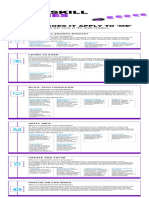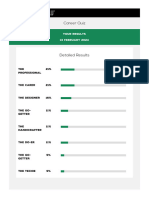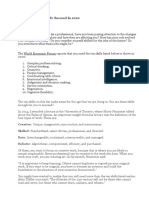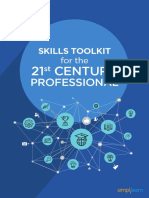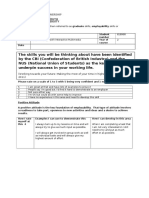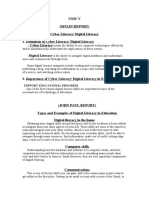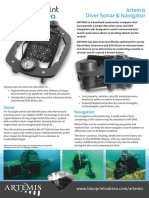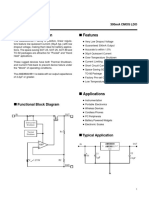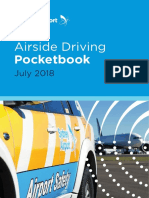Accenture Digital Skills:
Artificial Intelligence
Activity Pack
�Contents
01. Welcome to Digital Skills: Artificial Intelligence ........................................... 2
02. Identify the skills you already have ............................................................... 3
03. Important skills for the future of work ........................................................... 6
04. Self-assessment ............................................................................................ 13
05. Developing your skills ................................................................................... 15
10. Congratulations and next steps .................................................................... 18
11. Action plan ...................................................................................................... 18
12. Check your progress ..................................................................................... 20
1
�01. Welcome to Digital Skills:
Artificial Intelligence
Welcome to the Digital Skills: Artificial Intelligence course! This course will help you to
learn more about the past, present and future of artificial intelligence and explore its
potential in the workplace.
This activity pack has been designed to help you to build your understanding of the
topics covered in the course in more detail. There will be activities and questions
throughout where you can try to apply what you have learnt in your day-to-day home
and work life. These correspond to steps in the course so use this pack as you work your
way through the course.
You can also use the comment sections within the course to have a discussion with
other learners about what you have discovered!
Before getting started, you can answer the two questions below to identify what you
want to achieve by the end of these set of activities.
What are you most looking forward to learning in these activities?
I am looking for work based on AI.
What do you want to have achieved by the end of these activities?
i want to achieve indepth knowledge of AI
2
�02. Identify the skills you already
have
It can be hard to think of times when you have displayed a skill that employers are
looking for. But, if you think back to the experiences you’ve had throughout your life,
you will find times where you have demonstrated skills and have evidence to back them
up.
Remember:
• You do not need a qualification to show that you have a skill.
• Skills can be found in different life experiences – skills you have built outside of
work are often transferable to a work environment. Employers will often value
these just as much as skills developed in the workplace.
• There will be times where you have displayed a skill but didn’t even realise it!
Look at the diagram on the next page.
3
�4
�Think about the different questions asked in each section. Pick two questions from each
of the different boxes above and write your answers down in the empty diagram below.
I am helping my husband in his I am responsible for entire house
office. I do bank work, stock work. I enjoy lots of duty here
checking and sales analysis. like cooking to cleaning and
I have also suggested many driving to shopping. I have
ideas in our officse which saves joined 2 community groups as
time and cost. my hobby, where i learn
I don't give up very easily but something new and make new
alwayls go to the roots to solve friends as well.
challenges, I am happy to lead
the team with keeping everyone
together.
I love solving Sudoku ln my free yes, i love to join online and
time. offline courses to learn
I have attended many short something new. that's what i am
classes like different kinds of doing.
painting, english learning and I have worked many times in a
maths tricks etc group while studying and
I love badmintton and table teaching.
tennis. not exactly career break because
I have planned Dubai and Bali when my kids are too young I
and enjoyed vacation, have worked from Home as a
desiner.
I love extracurricullum activities
and participated in a lot of them.
5
�03. Important skills for the future
of work
Based on the technological changes and industry demands, we believe that the 8 ‘Skill
Families’ are the skills that are most likely to grow in the future. These are skills that
every employer is looking for in the digital age that will be required to thrive alongside
disruptive and emerging technologies such as AI.
This activity requires you to think about the skills you might have already developed in
each skill family from different areas of your life. This could include work, hobbies,
education or home life as mentioned in the previous section.
First, look at Faridah’s example below:
Remember, you can include more than one example per section, but try to think of the
most recent examples for each section, saying that you tutored Maths at a tuition centre
is much better than saying that you took part in a bake sale in primary school!
Now it’s your turn! Look at the table below. The first column describes the 8 skill families.
Think about examples of where you may have demonstrated these skills the best and fill
in the second column.
6
� What skills do I need to work
The 8 Skills Families What skills do I have?
on?
Lifelong learning I always look forward to learn I should spend more time on
something new, and practicing latest learnt things.
Skills to stay relevant, it.
be agile and curious, Recently I attended painting I should connet myself with
and continuously learn workshop and Resin Art same minded people for
to adapt to the pace of workshops. further discussion.
change
I experienced lots of new things I am always curious to learn
Some skills in this has come in these workshops. new useful things and ready
family are: to dedicate time and energy
• Agility & I also felt the market has for the same.
adaptability –
become bigger and there is once I get good mentor,
Being able to abudent oppertunities lying for things become very easy and
quickly adapt to dedicated person. interest doubled for me.
changing
situations.
• Positivity,
resilience and
perseverance –
being able to
recover from
difficult
situations.
• Openness and
curiosity –
Being open to
things
changing, and
an eagerness to
learn new
things.
7
�Technology at work Digital world is like fantacy. I am always curious to learn
new thing on Digital Tech.
Skills that enable us to During Lockdown , I completely
use digital jumped on zoom and google I will practice what i have
technologies at work meet for all communications learnt to get used to and
and communicate soon I will get master in the
online. Its a wonderful experience subject.
using Meta and Gemini chat
Some skills in this GPT I will use attend seminars
family are: and training programme on
• Digital literacy I love the new features of AI new software and their
– ability to find, updates.
evaluate, create
and share
content on
various digital
platforms
• Virtual
communication
– use of emails,
virtual
messaging apps
e.g., Microsoft
Teams and
Zoom
• Awareness and
ability to use
pro tools –
being able to
handle digital
devices and to
learn how to use
new
programmes or
software with
some
instruction or
training.
8
�Understanding I am using technology as much I am grateful for the
technology as possible in my day to day life. technology inventions and
glad to know about its past,
Exploring the basics of this year I have made how it is originated, who
technology and the personalised Year planner invented and what is the
history and future of using the help of technology inspiration behind it.
technological Canva for new year's gift.
development. everyone liked very much. I am also looking forward for
latest tech news about the
Some skills in this I have also made lots of party software and latest gadgets
family are: invitations and Thank You note and about company as well.
• Awareness of
with the help of digital world.
new technology
– with
technology
constantly
transforming,
stay up to date
with the latest
versions.
Exploring Coding I have not learn any coding so once I will learn coding and
far but looking forward to learn. all, I will use them to make
Skills to understand app.
coding and the basics I will also teach my kids
of programming about different computer
languages. languages and latest
softwares.
Some skills in this
family are:
• Understanding
computer
programming
languages –
there are many
different coding
languages out
there. It’s
important to be
aware and learn
about some of
the most widely
used languages.
9
�Discovering Data I know how to read graphs and Love to learn more about
pie chart and graphs and how to read and visualise the
Skills to understand simple diagrams and interprer it. data and interpret it more
data, how to interpret accurately.
it and how it can be Its a skill to observe the data in
used to guide decision given form and Predict how to
making. take benefit to increase sale
and efficiency of it.
Some skills in this
family are:
• Awareness of
data sources
and
interpretation –
being able to
identify data
and recognise it
as such, and to
interpret data or
data
visualisations
e.g., graphs or
charts.
Emotional Intelligence I believe no one can hurt you Everyone is allow to suggest
unless i allow it. and think from their point of
Learning how to so while working in the team view.
manage your focus on point rather than support and respect each
emotions, cope with words of your team mate. member and be displined.
stress and I enjoy working in the team and Go with the flow and ready to
communicate let's allow each member to pour adapt new chages.
effectively when their Idea.
working with others.
Some skills in this
family are:
• Self-awareness
and self-
regulation –
knowing your
behaviours and
characteristics
and being able
to adapt them
to a team
environment.
10
� • Communication I always prefer to talk to the One should know how to put
(listening and point in respected manner. the point.
presenting) – Don't interuupt while someone keep your point ready, so at
getting your is speaking and wait for your our turn it is feasible to put
message across turn nicely.
to others in listen everyone's point and
writing and in never judge it
conversation,
speech, clarity,
learning
strategy and
instructing.
Solving problems I always try to think out of the support new idea.
Box, Listen to all before jumping
Skills to think Observe the point from all to decision.
creatively and critically directions and try to think Try to modify each steps and
to solve problems. differently to get better output. curate it as per the
problems will come but they are requirement.
Some skills in this the stepping stones for bright problems are not Problems
family are: output. but they are path to the
• Creativity – I prefer to think from end, success.
coming up with means I think backward. first I
new approaches see the goal and steps behind find out the root and cause of
to solve a how to achiev and what are the problem and eradicate from
problem or paths. all set and I start the the base.
improve a steps to achieve the goal.
situation,
fluency and
originality of
ideas.
• Problem
solving – being
able to identify
what causes a
problem,
thinking
through and
evaluating
possible
approaches,
and then trying
out the most
promising ones.
11
�Critical Thinking critical thinking always help to I feel we should not
find better in me. completely depend on
Learning how to recently we hosted one system, but thinking indepth
evaluate and think exhibition, lots of challenges with using our experience
through decisions. were them. But analysing at and knowoedge will help us
each problen and evaluation to modify.
Some skills in this becomes easy. I must suggest discussion
family are: I always look at the feedback with experienced person is
• Critical and reviews, which really always beneficial.
helped me to improve a lot.
thinking –
Observing and
analysing
phenomena,
reactions and
feedback, &
drawing
conclusions
based on that.
Questioning
statements
presented as
facts that are
not backed by
evidence.
12
�04. Self-assessment
The table you just completed now contains many of your experiences and how they
relate to the relevant skills for the future.
Look back over your table. Do you have a lot of examples for one section? Is there a
section which you have struggled to find any examples where you have demonstrated
skills in that family? Maybe these skills need improving or developing?
Now, if there is a new job that you might want to go into, a new responsibly that you
would like to gain at work, or a skill that you have noticed that you haven’t developed as
much. Think of the requirements to accomplish this goal. You might want to use a search
engine to find out which skills might be required, such as a particular skill you might
need for a job.
Use this to fill in the “What skills do I need to work on?” column. Also, start thinking of
ways you could develop this skill.
Look at Faridah’s example below:
13
�Now your table should be fully complete!
This is a really great way of identifying your skills and finding out which ones need
developing further. This could be useful for future job applications or for a general self-
assessment of your skills.
Think about sharing it with a career counsellor or teacher.
14
�05. Developing your skills
Now, think about the skills you have just mentioned that you want to develop. Select
one.
What actions will you take to develop this skill?
Look at Faridah’s answer below she has used the SMART (Specific, Measurable,
Achievable, Relevant, Timebound) technique to help her develop this skill, below her
example we have given more details on what SMART goals means:
15
�SMART meaning:
Specific: You should answer the 5 W’s - what (skill are you building), why (the goal!),
who (can help you), where (can you build this skill?) and which (constraints requirements
do i have?)
Measurable: How will you determine you have build this skill? or what does good look
like??
Achievable: Is it realistic? Are there constraints or barriers? The target must be realistic
and must not be set too high or low.
Relevant: Does it align with your overall goal or other goals?
Time-bound: Is there a target date for progression or completion? You will need to think
about what you can do now and in 1/2/6/9/12 months’ time, etc.
Your turn! Thinking about one of the skills you want to develop, use the SMART
technique and fill in the table below with how you will achieve this. Remember they must
be tangible actions, so you can measure your progress along the way.
SMART Your answer
I want learn AI coure, as it is useful in my business. It will
save time and energy which I can use in other aspect of my
business. I am Joining AI learnig online classes for 3 months.
S Specific
I will enroll this class from next week, I will promise myself to
attend all sessions and complete all task and finish ii in
upcoming 3 months with cetificate.
M Measurable
16
� This is completely possibe as I have my own laptop and
internet service, so I can attend from my home as well as
from my office. I also have earphone and smartphone which
I can use whenever necessary.
A Achievable
Learning AI is relevent to my office work as well as in my day
to day life. I will also pass all this knowledge to my junior
staff and to my children, so they can also becoome pro in this
fast pacing world. I will use AI knowledge to expand and
upgrade my company, to increase the output from my
R Relevant
compant and surely to cut the corners of company expenses.
My target date for completion is 3 months from now.
T Time bound
17
�10. Congratulations and next
steps
Congratulations! Having completed the course and these activities, you are on track to
taking the next steps in your career! Have a go at completing the questions below to
understand your next steps. Also remember to keep track of your progress.
11. Action plan
Going forward, you can use these guiding questions to formulate an action plan!
Key skills (what are the key skills you have learnt during this course?)
Time management
critical thinking and
persistance
How will you apply these skills in your life or in the workplace?
I will break my task in small and complete them in decided time duration
critical thinking will boost me think out of the box and my outcome will be fabulous.
Persistancy is key to success.
18
�What obstacles might get in the way of you achieving this?
Time challenge
Digital terminology
New feature
What may help you overcome these barriers?
I will plan my to-do list well in advance so I can overcome it
I will use Internet to find out the meaning of difficult words and i will try to use them In
my vocab also,
I will practice all new features regularly so they wont remain new for me any more.
19
�12. Check your progress
Lastly, having a great plan doesn’t mean anything unless you check in on your
progress regularly. Remember to stay focused on your goal in whatever way works for
you using some of the techniques on this course.
Once you have completed this activity pack, you could set a reminder to come back in
a months’ time to see how you have been able to use the techniques to make progress.
Be honest with yourself in how much you have achieved but remember that some
changes may take time and practice.
You could discuss your goals and these activity packs with career advisers, friends,
family and anyone else who you think could help you get some feedback.
It is now down to you, be determined, act and importantly remember to have fun. This
is Your Career, make the most of it and make it work for you
Reflection – note down any thoughts or progress made using some of these
techniques.
made me stronger and more disciplined. love to learn more and more in challenging
subjects. no fear at all and i can feel that getting closer to the goal inch by inch. i am
feeling proud of myself.
20
� Useful resource section: Skills
Builder
Skills Builder is a useful resource that can help you learn more about how you can use
different communication styles to really engage your audience and convey messages
concisely.
The Skills Builder Partnership is a collaboration of over 700 educators, organisations
and employers working together towards a common mission: to ensure individuals of
all ages build the essential skills to succeed. An essential skills framework has been
developed which breaks down eight essential skills into teachable and measurable
steps. These are skills that you may already have, or skills you would like to develop.
Throughout the AI course and activity pack you have built your understanding of:
- Activity 2 & 3 – Relates to Step 7 of Leadership (I recognise my own strengths
and weaknesses as a leader)
- Activity 5 – Relates to Step 5 of Aiming High (I set goals for myself)
For more information, please refer to
https://www.skillsbuilder.org/universalframework, where you can access the Skills
Builder Interactive Universal Framework.
Copyright © 2023 Accenture. All rights reserved. Accenture and its logo are trademarks of Accenture 21

